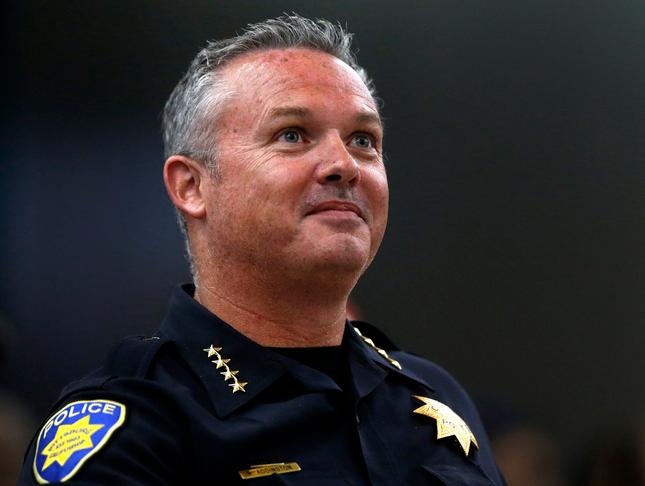ANTIOCH — In a bid to reduce the surge of violent crime, officers from the Antioch Police Department will soon be paid double time for picking up extra shifts in hot spot areas of the city.
The resolution, which was approved by the Antioch City Council 4-0 on Tuesday night, will pay the department’s sergeants, corporals, officers, community service officers, and dispatch personnel who work extra shifts double-time pay, which is twice the standard rate. Councilmember Mike Barbanica was absent from Tuesday’s meeting.
Funding for this effort is part of the $500,000 allocated for the gun violence reduction initiative, which was approved early last month. The allocation earmarked would pay for long-term assistance from outside law enforcement agencies to curtail a string of gun violence incidents in Antioch, especially in the Sycamore corridor and Cavallo Road area. The city is still mum on which agencies it will partner with until a deal is sealed.
The Antioch Police Department is working on a service agreement that will iron out details on getting outside help. On a broader level, the police chief is simultaneously in talks with the Contra Costa County Police Chiefs Association and the Contra Costa County Sheriff to draft out a memorandum of understanding that will entail a framework on the work and logistics that the municipal law enforcement agencies will provide.
The area of the city near Sycamore Drive, Mahogany Way, Peppertree Way, and L Street has been plagued with violence. Antioch recorded 15 shootings in September alone, police said. The surge of September violence began with the killing of 21-year-old Elijah Scales, who was shot on Peppertree Way on Sept. 2. This month, there have been multiple shootings in the city — three that took place on Election Day alone. On Nov. 11, a 23-year-old man was shot and wounded inside Sycamore Square, where police found him.
During a City Council meeting in October, the Antioch Police Department proposed double time for its officers who work on police details but faced opposition. Residents and councilmembers were concerned about having officers work beyond mandatory overtime shifts or paying them for double-time shifts. Councilmembers also instructed the police department to return with additional details.
At Tuesday’s meeting, Antioch’s Interim Police Chief Brian Addington said his department cannot solely rely on other agencies to provide the additional workforce needed.
“They have other priorities in their cities. I’m confident that we will get officers, but probably not at the level we need,” said Addington.
He said nobody knows the neighborhoods or the people there better than officers from his department.
“Officers from Pittsburg, Oakley, Kensington, and Hercules are going to be able to help and be a multiplier for us, but they’re not going to be as efficient as our officers,” said Addington.
He explained that his department’s officers assigned to monitor hotbed areas would be solely designated to work there, separate from the regular officers who are already handling patrol calls for services.
The Antioch Police Department has been grappling with low staffing levels following widespread police misconduct investigations and a texting scandal.
Addington said “severe staffing shortages” have precluded his department from stationing an officer in the Sycarmore corridor around the clock.
“Currently, at least one officer is stationed there every evening,” Addington told this news organization.
Addington assured residents and councilmembers that the wellbeing of these officers is a priority, adding only well-rested officers will be deployed.
“We don’t want our officers overworked (or experience work) fatigue, especially on this type of critical (police) detail,” he said.
The short-term move to station these officers will provide higher police visibility and presence to reduce crime, but Addington acknowledged that long-term holistic and sustainable approaches are needed.
That would entail working with faith and community-based organizations.
“But in the interim, we have to do something to stop that violence now and authorizing the double time is imperative. So I’m pleading with you, that you approve this,” said Addington.
During public comment, resident Ralph Hernandez, a retired police officer, disagreed with the proposal, claiming that officers would face fatigue working beyond their regular shift.
“Yes, we need to do something about it (the crime). But some of the blame for that crime has to come back to the police department as well as the marijuana places that you’ve (city council has) approved,” said Hernandez.
Councilmember Monica Wilson sought clarification and asked if officers from other agencies would be paid $200 an hour for the extra shift they work. Addington said Antioch reimburses the cities the officers work for at $200 an hour.
“Those cities are paying their officers whatever their contractual agreement is for them to work extra shifts, which is probably a time and a half,” clarified Addington.
Councilmember Tamisha Torres-Walker, who had previously voiced concerns about overworked officers, said she spoke to other police chiefs and was informed that many are facing staffing shortages too.
Torres-Walker said she remains committed to community-based violence prevention strategies that have worked in other cities.
“But because other chiefs have already told me that it would be hard for us to get additional assistance, and people in my community are saying we need to do something until we can get the right thing off the ground, so I’m going to support this,” said Torres-Walker.
According to a city staff report, Antioch police officers are required to work 7.5 hours of mandatory overtime every month. However, the department’s staffing levels have been increasing, which would see a drop in mandatory overtime. The report also noted that a department-wide shift change scheduled for January will eliminate the mandatory overtime.












